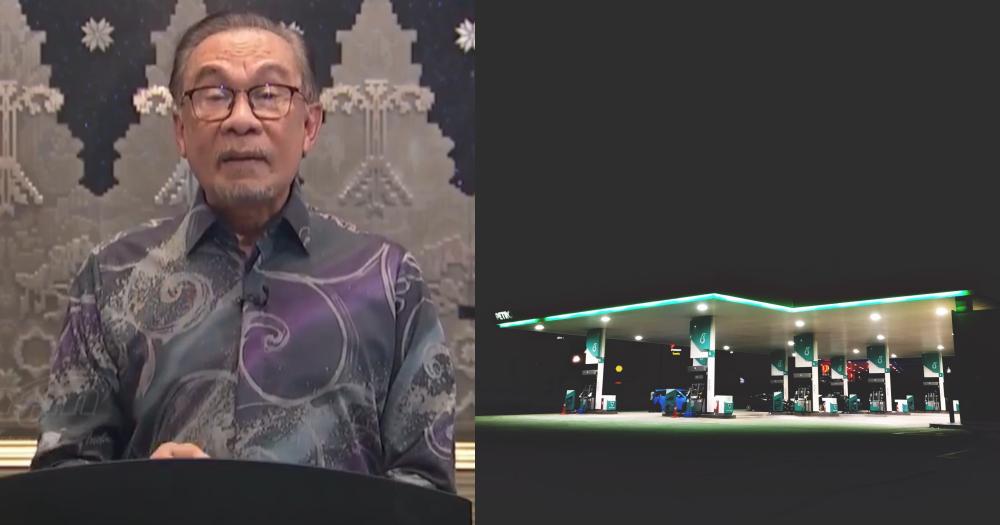On May 21, Malaysian prime minister Anwar Ibrahim announced that the country will implement targeted subsidies on fuel, starting with diesel.
It is projected that the subsidy rationalisation program will save Malaysia RM 4 billion (S$1.15 billion) annually.
A definitive start date was not revealed.
Blanket party
Anwar delivered the news in a over 40-minute long speech that was also live-streamed on social media and on major news channels.
Anwar said that the current scheme of providing a blanket subsidy for all purchases of diesel by Malaysian cars was not logical nor reasonable, as reported by MalaysiaKini.
Instead, the government will replace the blanket subsidy with a targeted subsidy, that would only be accessible to the bottom 40 and middle 40 per cent income groups, as well as the operators of diesel vehicles in specific economic sectors.
Anwar did not reveal a definitive start date for the end of blanket subsidies or the start of the new targeted subsidy program, instead saying that relevant ministries would share more information soon.
East Malaysia unaffected
During the speech he said that the fuel subsidy changes would only apply to Peninsula Malaysia.
The introduction of the targeted diesel subsidy in Sabah and Sarawak would be postponed, as almost all families there use diesel for their vehicles.
Bernama reported that in order to curb drastic rises in the price of goods and services, the government is preparing subsidies for traders using commercial diesel vehicles.
Lower-income groups unaffected
Public transport vehicles and goods transportations vehicles would receive subsidies in order to help them, such as bus and taxi operators, and fishermen.
The government agreed to provide cash assistance to owners or private diesel vehicles that are eligible, including smallholders, farmers and traders.
He said that the targeted diesel subsidy was aimed at the poorest 40 per cent and the middle 40 per cent income groups who need to use diesel for their businesses, farming, mining, rearing livestock, or fishing.
These groups, Anwar said, would not be impacted by the hike in diesel prices.
Top 20 per cent and foreigners
Anwar also said that by tying diesel subsidies to already existing government programs, it meant that the Malaysian government would be able to better target the subsidy.
This means that the top 20 per cent of income earners and 3.8 million foreigners, presumably residents in Malaysia, will not be eligible for the targeted fuel subsidy.
Anwar estimated that the change to a targeted fuel subsidy would save the Malaysian government RM4 billion (S$1.15 billion) annually.
He said:
“The targeted diesel subsidy will only impact the rich and foreigners and not burden the rakyat (people)”.
Anwar also announced further cash assistance and allocations delivered through existing aid programs, which the government was paying for through funds it had saved from “wasted subsidies that profited the wealthy and foreigners”.
Will this move stop Singaporeans?
The announcement comes 10 days after the Kuala Kubu Bahru by-election.
The election was won by the Pakatan Harapan coalition, and generally seen as an endorsement of Anwar’s unity government.
However, prior to the by-election, it was reported by ST that Anwar's government planned to cut fuel subsidies just after the by-election.
Anwar called the reporting of the story “unethical”, although he did not mention the Singaporean publication by name.
His Communications Minister Fahmi Fadzil said on May 4 that the reports had “pre-empted” the process, and that the Malaysian cabinet had yet to discuss the issue at the itme.
Anwar has joked before that the blanket fuel subsidy mainly benefitted Singaporeans going to Malaysia to buy cheap fuel.
While this first stage is unlikely to affect many Singaporeans, when the fuel subsidy reduction finally impacts petrol, we may finally see an end of Malaysian motorists complaining about Singaporean cars “stealing” subsidised fuel.
Cheapest in the world
Fuel in Malaysia is some of the cheapest in the world due to subsidies introduced in 1983.
According to Bloomberg, when combined with cooking oil subsidy, it cost the Malaysian government RM81 billion (S$23.3 billion) last year.
However, Anwar is attempting to end subsidies amidst a major cost of living crisis, risking making a naturally unpopular move even more so.
But Malaysia is also facing high levels of government debt, estimated to be over 60 per cent of GDP, and has said he will do what he can to cut wasteful spending.
Related stories
Top image via Anwar Ibrahim/Facebook & Lily Banse on Unsplash

If you like what you read, follow us on Facebook, Instagram, Twitter and Telegram to get the latest updates.



